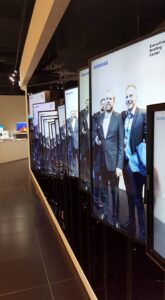
There’s one thing that separates successful people from the rest: Waiting for someone to approve your ideas vs. doing things you believe are right.
Often people feel they are not empowered. However, in reality, you have more freedom to act than you think. Understanding this is your biggest lever to improve things for you, your team, your company. Use your autonomy to get things done. Don’t rely on other people, rather do whatever needs to be done for your project.
Sometimes it’s only one aspect that makes a difference: In order to be successful, overstep boundaries.
 Kids do this naturally, they seek the boundaries and re-evaluate them over and over again. What’s more – they are incredibly successful doing so in learning and growing. That’s agility for you.
Kids do this naturally, they seek the boundaries and re-evaluate them over and over again. What’s more – they are incredibly successful doing so in learning and growing. That’s agility for you.
Then we teach them to ask for permission. Even for going to the toilet! They gradually transition into a different behavioral pattern, which is not conducive to achieving great things. The famous psychologist Martin E.P. Seligman even coined this as learned helplessness . This leads to situations in which a person expects from the very beginning not to be able to change certain conditions or circumstances. You may be convinced that you have no control over the situation and cannot effectively influence it yourself. This leads to passivity.
Consider how you were raised. Most likely you had to ask for permission before doing anything. Of course, this carries over when we become adults.
But you are an adult now. You are autonomous and empowered to act. You will not be successful, if you do not take responsibility and do what’s right.

I understood that long ago. This also has to do with how I grew up. My mom was a hippie and she raised me to challenge authority when it is not rational. You could call it anti-authority education. I don’t get along with fake authorities like power-hungry janitors. I will follow the rules as long as they make sense and those who enforce it behave respectfully, say reasonable things, in an appropriate tone. But I will likely not if they don’t. Or if applying the rules does not make sense.
I was educated to think and to make reasoned decisions, the opposite of the rule-following subject: the rather free-thinking school of the enlightened man. My mother taught me to choose my actions based on reason, constraints and necessities and not based on rules.
Consider this — if you want to truly make a massive impact in society, can you do it by asking for permission?
Consider how you have to ask for permission from your boss before taking time off at work. We became so accustomed to asking for permission that it paralyses us. This means that, if we can’t ask for permission in order to do something, we don’t even attempt it at all.
In case we fail or ‘get in trouble’, we have someone to blame.
Always take the risk, with the chance of pissing others off. If anyone gives you any grief, you can always (pretend to) be very remorseful, and ask for permission. It is kind of sly and devilish way of getting what you want in life, and I believe it is the non-sucker way of living a life.

One example from business: When I ramped up Upday , we had to be fast to meet our deadlines. However, this was a joint venture between Samsung and Axel Springer – corporations are usually known to move really slow. We pushed the boundaries quite often in those times.
We outgrew our offices quite fast, we were told that we could not fit more people in, and therefore, we weren’t getting any more furniture. The corporate janitors told us we couldn’t move more people in our office. What we did? We went to the unused offices and to the basement of the huge Axel Springer building and just grabbed all the spare desks and chairs which were stored there and weren’t used for years. We carried them into our office, until there was truly no more space. When even this was not enough anymore, we shared desks. We crunched heavily and took time off to compensate without any official approval. The best part, we locked the workplace auditors out when they came to inspect our office. Obviously, they complained, but corporations move very slow, remember? We were very confident in our goals and mission.
Sometimes, to get things done, you must choose to not follow the rules.

This way, we delivered three completely different apps in nine months. The third version was preinstalled on all Samsung S7, being on the minus one page of it and following devices. Upday is now the biggest news app in all of Europe. That was quite a challenge and could not by any means have been achieved while following the rules.
A last funny story of that time: when I was in Korea on a business trip, we did a karaoke session with senior executives from Samsung. The final deal for our joint venture was still not fully closed and we were drinking. In the end, we had a 10.000 dollar bill for vodka and karaoke. No way I could have asked for permission. I got an invoice which resembled a laundry pick-up slip with funny Korean signs. I submitted it as expenses to our corporate and got my money back. It was the right thing to do, even if it sounds lavish. This evening helped close the deal.
Picture this situation: you are walking through a village, in the middle of nowhere, at 3am in the morning. And you are standing before a red traffic light, alone. You haven’t seen a single car in the last hour. I can tell you what most people do: They wait for the traffic light to become green. Especially in Germany. I think it’s perfectly okay to run a red light when you’re in a hurry and there’s no one around, and that’s what this is all about.
Now picture that it is your company. Your whole company is standing at a red traffic light, and maybe the traffic light is broken. And nobody is looking for a different route. If you need to pass this traffic light to be successful in business, you need to cross! The thing is, most rules are only in your head and don’t exist in reality. Other rules are meant to be broken. Make your decisions based on reason, constraints and necessities. And not on rules.
In order to get to my goal faster, I will sometimes decide to not follow the rules. And as it is with red lights, so it is with corporate culture and processes. By doing things like this, you realise that you actually have a lot more room than you think you have. A lot more autonomy and power than you believe.
Break the rules, not the law.
Keep in mind: change agents act professionally. An organisation is designed by professionals. Not by amateurs. Therefore, change agents should also think, act and communicate like professionals. Overstepping boundaries does not mean sloppy work!
As developers, we have to do this kind of thing all the time. Small refactorings on the side, writing tests and documentation. These decisions determine if something is really done or will come back in the future. It makes the difference between reducing technical debt vs. increasing it. Ultimately, by not following the rules, you are deciding on the future productivity of the business.
Be annoying, tell management when they do things wrong.
 We as management give you expectations on the outcome and you are the masters on how to achieve it. We empower you to make decisions. Use your autonomy to get things done. Don’t wait for permission, most of the time you already know better than others. Take responsibility!
We as management give you expectations on the outcome and you are the masters on how to achieve it. We empower you to make decisions. Use your autonomy to get things done. Don’t wait for permission, most of the time you already know better than others. Take responsibility!
Even I sometimes twitch briefly: Recently a new (remote) hire told me he bought/ordered a new laptop for himself, without any approval process. I needed some seconds, but he did the right thing – he needed it to work and waiting for approvals would have just wasted time.
I want you to understand one thing: You get away with much more than you think! As long as the intention is good, push the boundaries. Get. Things. Done.